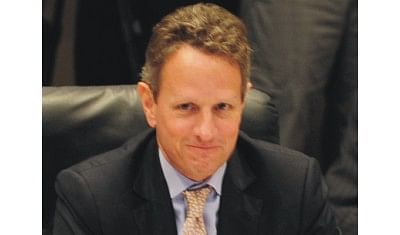US urges Asia to help save global economy

TIM GEITHNER
The United States urged Asia Thursday to do more to stimulate global growth to offset the eurozone crisis, ahead of a summit in Hawaii where Washington is seeking to shape the rules for the emerging Pacific region.
After hosting a meeting of Asia-Pacific finance ministers, US Treasury Secretary Tim Geithner said talks had been dominated by how to make growth more balanced and sustainable in the future, given the crisis in Europe.
Geithner had a stark message for leaders such as Chinese President Hu Jintao and Japanese Prime Minister Yoshihiko Noda gathering in tropical Honolulu for this year's Asia-Pacific Economic Cooperation (APEC) forum.
"Asian economies will need to do more to stimulate domestic demand growth -- both so they are less vulnerable to slowdowns, such as the situation in Europe, and so they can continue to contribute to global growth," he said.
APEC's 21 member economies account for about 40 percent of the world's population, more than 50 percent of its gross domestic product and 44 percent of global trade.
"While APEC economies are the most vulnerable to a global slowdown, they can also play the greatest role in contributing to the global recovery and establishing the foundations of strong, sustainable, and balanced future growth," Geithner said.
Europe warned Thursday that the debt crisis was dragging the region towards a new recession as Greece chose a new prime minister to try to pull it back from the brink of financial disaster and Italy too lurched into crisis.
In Honolulu, where US President Barack Obama hopes this weekend to unveil the broad outlines of a landmark trade pact, there were signs of tensions between the United States and the Asia-Pacific's other dominant power, China.
Secretary of State Hillary Clinton, previewing the US message for the summit of the 21-member APEC forum, said the region stands at a "pivot point" as it becomes "the world's strategic and economic center of gravity."
Saying that the post-World War II institutions between the United States and Europe had paid "remarkable dividends," Clinton said the time had come for "a more dynamic and durable trans-Pacific system."

 For all latest news, follow The Daily Star's Google News channel.
For all latest news, follow The Daily Star's Google News channel. 




Comments